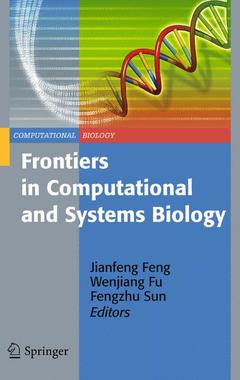Frontiers in Computational and Systems Biology, 2010 Computational Biology Series, Vol. 15
Langue : Anglais
Coordonnateurs : Feng Jianfeng, Fu Wenjiang, Sun Fengzhu

Biological and biomedical studies have entered a new era over the past two decades thanks to the wide use of mathematical models and computational approaches. A booming of computational biology, which sheerly was a theoretician?s fantasy twenty years ago, has become a reality. Obsession with computational biology and theoretical approaches is evidenced in articles hailing the arrival of what are va- ously called quantitative biology, bioinformatics, theoretical biology, and systems biology. New technologies and data resources in genetics, such as the International HapMap project, enable large-scale studies, such as genome-wide association st- ies, which could potentially identify most common genetic variants as well as rare variants of the human DNA that may alter individual?s susceptibility to disease and the response to medical treatment. Meanwhile the multi-electrode recording from behaving animals makes it feasible to control the animal mental activity, which could potentially leadto the development of useful brain?machine interfaces. - bracing the sheer volume of genetic, genomic, and other type of data, an essential approach is, ?rst of all, to avoid drowning the true signal in the data. It has been witnessed that theoretical approach to biology has emerged as a powerful and st- ulating research paradigm in biological studies, which in turn leads to a new - search paradigm in mathematics, physics, and computer science and moves forward with the interplays among experimental studies and outcomes, simulation studies, and theoretical investigations.
Analysis of Combinatorial Gene Regulation with Thermodynamic Models.- RNA Secondary Structure Prediction and Gene Regulation by Small RNAs.- Some Critical Data Quality Control Issues of Oligoarrays.- Stochastic-Process Approach to Nonequilibrium Thermodynamics and Biological Signal Transduction.- Granger Causality: Theory and Applications.- Transcription Factor Binding Site Identification by Phylogenetic Footprinting.- Learning Network from High-Dimensional Array Data.- Computational Methods for Predicting Domain–Domain Interactions.- Irreversible Stochastic Processes, Coupled Diffusions and Systems Biochemistry.- Probability Modeling and Statistical Inference in Periodic Cancer Screening.- On Construction of the Smallest One-sided Confidence Intervals and Its Application in Identifying the Minimum Effective Dose.- Group Variable Selection Methods and Their Applications in Analysis of Genomic Data.- Modeling Protein-Signaling Networks with Granger Causality Test.- DNA Copy Number Profiling in Normal and Tumor Genomes.- Spatial Disease Surveillance: Methods and Applications.- From QTL Mapping to eQTL Analysis.- An Evaluation of Gene Module Concepts in the Interpretation of Gene Expression Data.- Readout of Spike Waves in a Microcolumn.- False Positive Control for Genome-Wide ChIP-Chip Tiling Arrays.
Reviews the current hot topics in computational biology and system biology, using probability and statistics as mathematical tools With contributions by towering figures in the field from across the globe, including Prof. Michael Waterman and Prof. Terry Speed Includes supplementary material: sn.pub/extras
Date de parution : 09-2012
Ouvrage de 24 p.
15.5x23.5 cm
Date de parution : 06-2010
Ouvrage de 24 p.
15.5x23.5 cm
Thèmes de Frontiers in Computational and Systems Biology :
Mots-clés :
Computational Biology; Probability; Statistics; System Biology; algorithms; genome
© 2024 LAVOISIER S.A.S.



